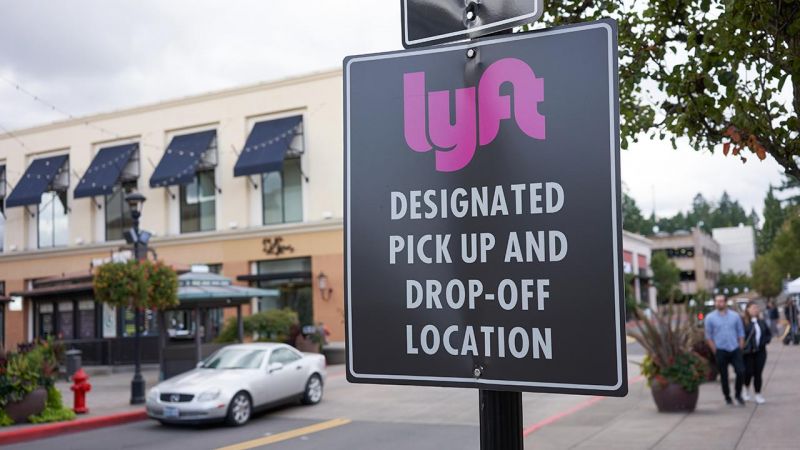Ride-Hailing Company Lyft Vows to Switch to Fully-Electric Vehicles by 2030
【Summary】San Francisco-based company Lyft Inc. said on Wednesday that every vehicle on its ride-hailing and rental car platform will be fully-electric by 2030.

Drivers working for ride-hailing company Lyft Inc. have until 2030 to make the switch to fully electric vehicles. The San Francisco-based company said on Wednesday that every vehicle on its ride-hailing and rental car platform will be fully-electric by 2030, the company announced in a blog post today.
Lyft is the biggest U.S. rival to Uber Technologies Inc., which is also based in San Francisco.
Lyft said it would not provide direct financial support to drivers for switching from gas-powered cars, Instead, the company plans to push competitors, lawmakers and automakers to make it easier for drivers to switch to electric vehicles by creating financial incentives, Lyft executives said during a call.
John Zimmer, Lyft's co-founder and president, said the company has reached a scale to impact policy change.
"By working with drivers to transition to electric vehicles, we have the potential to avoid tens of millions of metric tons of GHG emissions to the atmosphere and to reduce gasoline consumption by more than a billion gallons over the next decade," the company wrote in a blog post.
It's a big challenge to get all of its drivers to switch to electric vehicles. Right now, electric vehicles account for just under 2% of all new vehicles purchased in 2019. And they cost more too. Close to 80% of EVs sold in the U.S. are made by electric automaker Tesla.
Regardless, Lyft said it would aggressively promote and help drivers access incentive funds to purchase electric vehicles.
"With transportation recently overtaking electricity as the single largest source of planet-disrupting greenhouse gas (GHG) pollution in the US and the second-largest source in Canada, we believe now is the time for Lyft to lead a radical shift in strategy."
"If policymakers do their part in the next few years, EVs should reach cost parity with gasoline vehicles by mid-decade," the company said.
Environmental activists have called on Lyft and its biggest U.S. rival Uber to electrify their fleets. A February study by the Union of Concerned Scientists found ride-hailing services create around 50% more carbon emissions than private car trips.
In cities such as San Francisco and New York, ride hailing operators are being blamed for an increase in traffic in the city center, creating gridlock during times of peak demand, which further contributes to harmful carbon emissions. New York officials voted in 2018 to limit the number of ride-hailing vehicles that can operate in the city.
Uber has not made a blanket commitment to electrification, but is partially subsidizing drivers' electric vehicle purchases in London, where the push is even greater to substantially reduce greenhouse gas emissions in accordance with the Paris Agreement.
One concern however, is the higher cost of electric vehicles for drivers. Lyft has said that 80% of its drivers have full or part-time jobs and offer rides to supplement their income. Unless rival Uber has a similar policy for the use of EVs on the platform, drivers might jump ship to Uber instead of investing in an electric vehicle for a part-time job.
Lyft offers rental services for drivers and consumers through its own platform and said it would buy electric vehicles for the rental fleet.
The company also said it was in active discussions with carmakers on electrification, but declined to provide details. Lyft did say however, that the price for ride-hailing trips in battery-powered cars might cost less in the future.
"Now more than ever, we need to work together to create cleaner, healthier, and more equitable communities," said Zimmer.
Lyft is hoping that the rest of the transportation industry follows its lead and makes the same commitment to the environment.
"Success breeds success, and if we do this right, it creates a path for others. If other rideshare and delivery companies, automakers and rental car companies make this shift, it can be the catalyst for transforming transportation as a whole."
Lyft drivers also can save money by using a battery-powered car on the platform. The company said that drivers renting cars through is car rental business Express Drive currently save an average of $50-70 per week on fuel costs alone.
resource from: Reuters
-

Two Ford Crown Victorias Still Operating as Taxis in NYC
-

Mazda CEO's Opinion on EV Adoption in the U.S.
-

Hyundai's revolutionary powertrain design
-

Sustainability focus urged by Michelin Fleet Panel
-

BM Catalysts' UK Expansion
-

Warwick University's £12m funding for electric vehicle battery progress
-

Executive X Series: Unveiling the Powerful City/Vios Competitor
-

Hollywood couple defies expectations, showing affection after 20 years
- Panasonic Announces Multi-Year Agreement to Supply Electric Vehicle Batteries to Lucid Group
- GM Launches its Dealer Community Charging Program, Aims to Install 40,000 EV Chargers in Rural Areas and Small Towns Across the U.S.
- China’s New Intelligent EV company JIDU Launches its Limited-Edition Robocar Called the ‘ROBO-01 Lunar Edition’
- SK Inc. Invests $100 Million in North Carolina-based EV Charging Hardware Developer Atom Power
- GM's Rebate of up to $6,000 on the Bolt EV and EUV Has a Big Stipulation
- Automakers Urge Consumers to Buy an EV Before Tax Credit Changes
- Tesla’s Battery Supplier Panasonic is Close to Selecting the Site of its New U.S. Battery Plant
- EV Brand Polestar Announces $1.6 Billion in New Financing as its Stock Price Falls Below $5
- LG Chem is Investing $3.2 Billion to Build a Cathode Manufacturing Facility for Electric Vehicle Batteries in Tennessee
- Electric Hypercar Developer Rimac Raises $500 Million Euro in Series D Round, Investors Include Porsche, Softbank and Goldman Sachs



















 About Us
About Us Contact Us
Contact Us Careers
Careers